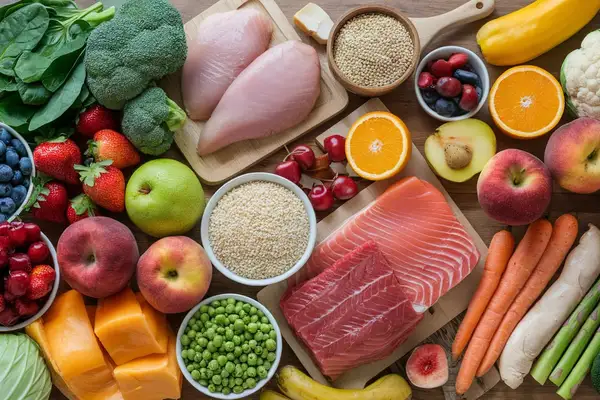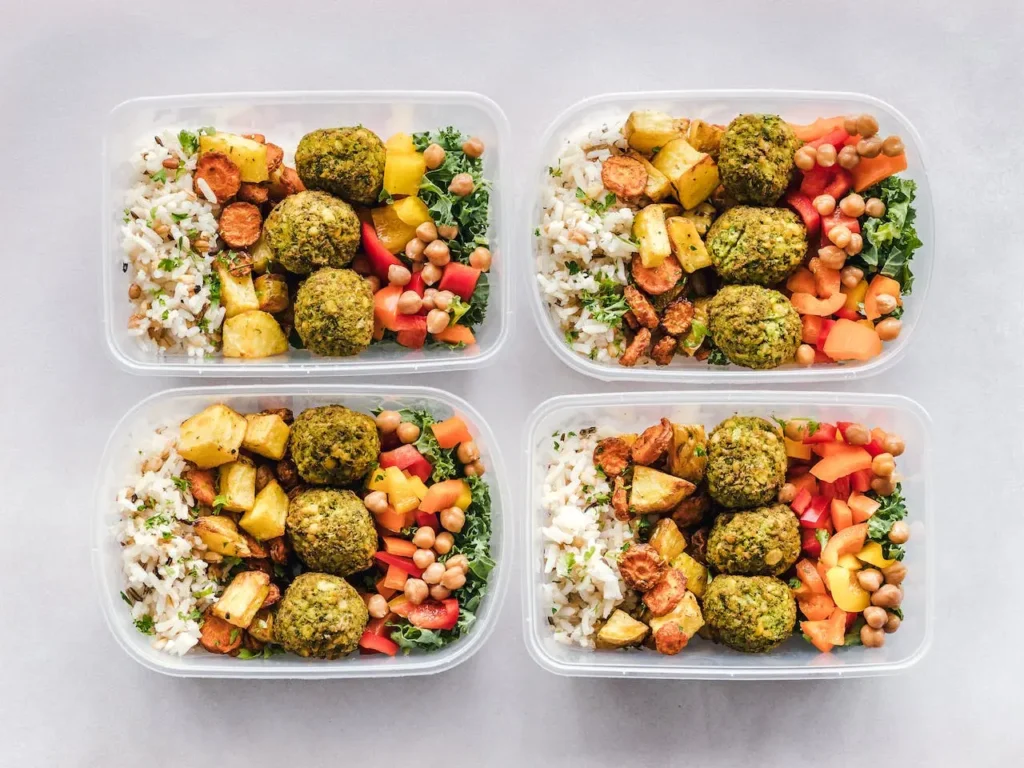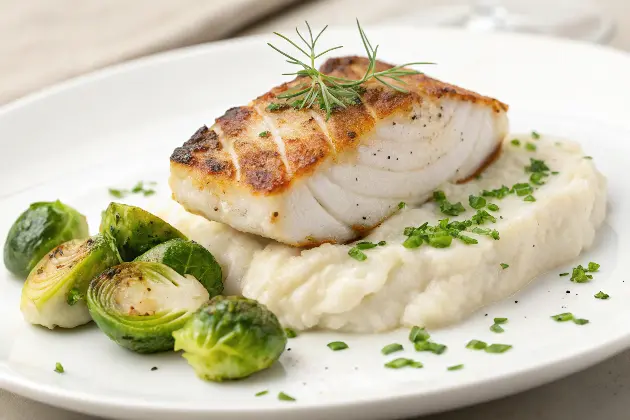The Menopause Diet 5 Day Plan to Lose Weight: Ultimate Guide
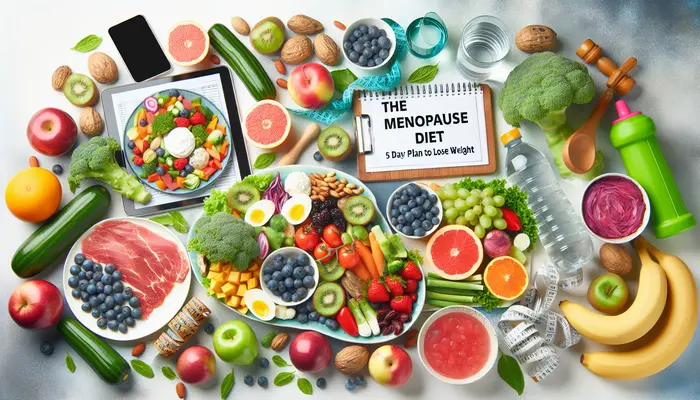
- What is the Menopause Diet?
- Key Components of the Menopause Diet
- The Menopause Diet 5 Day Plan to Lose Weight
- Menopausal Diet Food List
- Worst Foods for Menopause
- Benefits of the Menopause Diet
- Supplement the Menopause Diet with Exercise
- Conclusion
- Frequently Asked Questions (FAQs)
- The Menopause diet resources
- Citations
This post may contain affiliate links, meaning I may earn a commission if you make a purchase, at no extra cost to you. I only recommend products I trust. Thank you for your support.
Menopause marks a significant phase in a woman’s life, often accompanied by weight gain due to reduced estrogen levels and changes in metabolic rate.
This stage is characterized by a natural increase in abdominal weight and a risk of gaining about 1.5 pounds annually during a woman’s 50s.
Menopause is associated with a lower resting metabolic rate, contributing to more body fat and muscle mass loss.
These hormonal fluctuations result in a slower metabolism, causing fewer calories to be burned and more fat to accumulate.
The menopause diet 5 day plan to lose weight is tailored for this demographic, focusing on alleviating symptoms while promoting weight management.
The menopause diet aligns with the principles of the mediterranean, DASH, and flexitarian diets, which are known for their health benefits, including heart, brain, and bone health.
This article will explore the components of the menopause meal plan, offering a detailed 5-day guide to support weight loss goals while addressing the unique nutritional needs of women during menopause.
What is the Menopause Diet?
The menopause diet is a balanced, nutrient-dense eating plan designed to ease menopausal symptoms while supporting overall long-term health through hormonal balance, bone strength, cardiovascular health, and weight management.
It involves consuming seafood twice weekly for omega-3 fatty acids, staying well hydrated, and limiting the intake of alcohol, sodium, and added sugars.
The menopausal diet provides a structured eating regimen emphasizing proteins, healthy fats, and the importance of regular meals with an adequate protein intake of 25-30 grams per meal.
Key Components of the Menopause Diet
The menopause diet focuses on key components that can help manage symptoms associated with menopause and support weight loss.
Incorporating these components into a daily eating plan can help address the nutritional needs and symptom management required during menopause.
These components include:
1. Calcium and vitamin D
- With declining estrogen levels, bones can become more vulnerable to loss of density. The menopause diet emphasizes calcium-rich foods and vitamin D to protect and strengthen bone health.
- Aim for 1,200 to 1,500 milligrams of calcium per day through foods like yogurt, fortified milk, and leafy greens.
2. Iron
- Include 8 milligrams daily from sources like lean meats, leafy greens, and nuts to combat fatigue and support immune function.
3. Fiber
- At least 21 grams per day from whole grains, fruits, and vegetables are packed with antioxidants that help combat oxidative stress and aid in digestion.
4. Healthy fats
- Incorporating omega-3 fatty acids through fatty fish, walnuts, chia seeds, and flaxseeds helps maintain heart health, reduce inflammation, and support overall cellular function.
5. Phytoestrogens
- Foods like soybeans, chickpeas, and flaxseeds contain phytoestrogens that may help balance hormones and alleviate hot flashes.
6. Hydration
- Staying well-hydrated is important, especially as menopausal women may experience an increased risk of urinary tract infections.
7. Moderation intake
- Limit saturated fats to less than 7% of daily calories, reduce salt and sugar intake, and restrict alcohol to one drink per day or less.
The Menopause Diet 5 Day Plan to Lose Weight
The menopause diet 5 day plan to lose weight is designed to manage menopause symptoms and support weight loss by integrating nutrient-dense foods that balance hormones.
In addition to this diet plan, regular physical activity and proper hydration (at least 8 cups of water per day) are emphasized to boost metabolism and aid in maintaining a healthy weight.
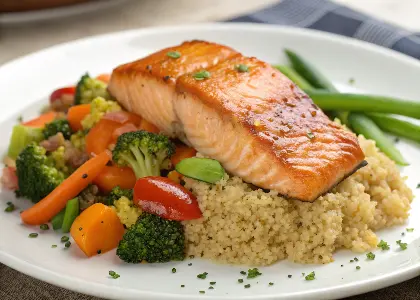
Day 1
Breakfast:
- 1 cup of Greek yogurt with a handful of mixed berries, 1 boiled egg, and 1 slice of whole grain toast
Lunch:
- Grilled chicken breast salad with mixed greens and a light vinaigrette dressing (3-4 oz of chicken breast, 2 cups of mixed greens, ½ cup of cherry tomatoes, and ½ cup of sliced cucumbers)
Dinner:
- Baked salmon with steamed broccoli and quinoa (3-4 oz of salmon, 1 cup, ½ cup cooked quinoa)
Snack:
- 1 small apple with a tablespoon of almond butter
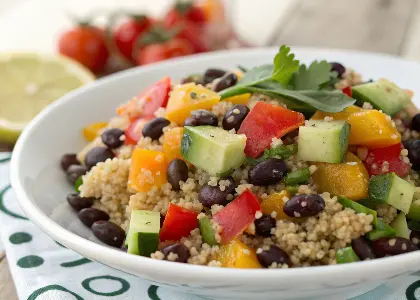
Day 2
Breakfast:
- Spinach and feta omelet made with 2 eggs and 1 slice of whole grain toast
Lunch:
- Quinoa and black bean salad with diced bell peppers, red onions, and a squeeze of lime (½ cup of quinoa and ½ cup of black beans, 1 cup of mixed vegetables)
Dinner:
- Turkey meatballs with zucchini noodles and marinara sauce (3-4 turkey meatballs, 1 medium zucchini)
Snack:
- 1/2 cup of edamame

Day 3
Breakfast:
- Smoothie made with almond milk, spinach, frozen berries, and a scoop of protein powder (1 cup of smoothie)
Lunch:
- Grilled shrimp salad with mixed greens, avocado, and a light citrus dressing (3-4 oz shrimp, 2 cups of mixed greens, ¼ avocado)
Dinner:
- Grilled tofu with 1½ cups of stir-fried mixed vegetables and ½ cup of brown rice (3-4 oz tofu)
Snack:
- 1 small orange

Day 4
Breakfast:
- Chia seed pudding made with almond milk, topped with sliced almonds and a sprinkle of cinnamon (1 cup of chia seed pudding)
Lunch:
- Lentil soup with a side of mixed green salad and a light vinaigrette dressing (1 cup of lentil soup, 2 cups of mixed greens)
Dinner:
- Baked lemon herb chicken with brown rice and steamed asparagus (4 boneless chicken breasts, 1 cup asparagus)
Snack:
- 2-3 celery sticks and 2 tablespoons of hummus

Day 5
Breakfast:
- Cottage cheese mixed with chopped peaches and a sprinkle of flaxseeds (1 cup of cottage cheese and 1 medium peach)
Lunch:
- Tuna salad made with light mayo, diced celery, and served on a bed of mixed greens (3-4 oz of tuna salad, 2 cups of mixed greens)
Dinner:
- Tempeh and roasted vegetable quinoa bowl (8 oz tempeh, 2 cups vegetable broth, ½ cup of cooked quinoa)
Snack:
- 1 small handful of mixed nuts (almonds, walnuts, cashews)
Menopausal Diet Food List
Incorporating specific foods into your diet during menopause can significantly impact your overall health and help manage symptoms.
Here’s a focused list of beneficial foods to include in the menopause diet:
1. Phytoestrogen-rich foods
- Soy products (tofu, tempeh, edamame)
- Flaxseeds
- Sesame seeds
- Legumes (lentils, chickpeas, black beans)
2. Calcium-rich foods
- Dairy products (milk, yogurt, cheese)
- Leafy green vegetables (kale, collard greens, spinach)
- Fortified plant-based milk (almond milk, soy milk)
- Fortified orange juice
3. Vitamin D foods
- Fatty fish (salmon, mackerel, sardines)
- Fortified dairy or plant-based milk
- Fortified breakfast cereals
- Sunlight exposure
4. Healthy fats
- Avocados
- Nuts (almonds, walnuts, cashews)
- Seeds (chia seeds, pumpkin seeds, sunflower seeds)
- Fatty fish (salmon, trout, mackerel)
5. Lean protein sources
- Skinless poultry (chicken, turkey)
- Fish (salmon, tuna, trout)
- Tofu
- Lentils and legumes
6. Fiber-rich foods
- Whole grains (quinoa, brown rice, oats)
- Fruits (apples, berries, oranges)
- Vegetables (broccoli, Brussels sprouts, carrots)
- Beans and legumes (black beans, chickpeas, lentils)
7. Hydrating foods
- Water-rich fruits (watermelon, cucumber, oranges)
- Vegetables with high water content (cucumbers, celery, tomatoes)
- Herbal teas
8. Other nutrient dense foods
- Colorful vegetables (bell peppers, sweet potatoes, beets)
- Berries (strawberries, blueberries, raspberries)
- Whole grains (barley, bulgur, farro)
- Probiotic-rich foods (yogurt, kefir, kimchi)
9. Herbs and spices
- Turmeric
- Ginger
- Cinnamon
- Garlic
Worst Foods for Menopause
To manage symptoms effectively and promote overall health during menopause, certain foods should be limited or avoided.
Here’s a focused list of foods to steer clear of in the menopause diet:
1. Spicy foods
- Hot peppers
- Spicy curries
- Chili-based dishes
2. High sodium foods
- Processed meats (sausages, bacon)
- Canned soups
- Salty snacks (chips, pretzels)
3. Processed foods
- Fast food
- Packaged snacks (cookies, cakes)
- Sugary breakfast cereals
4. Caffeine and alcohol
- Coffee
- Black tea
- Energy drinks (caffeine)
- Beer
- Wine
- Spirits (alcohol)
5. Fatty meats
- High-fat cuts of red meat
- Processed meats (hot dogs, sausage, bacon, salami, corned beef, salami)
- Ribeye steak
- Bologna
6. Sugary foods and beverages
- Soda
- Sweetened fruit juices
- Candy
- Pastries
- Ice cream
7. Saturated and trans fats
- Deep-fried foods (French fries, fried chicken)
- Commercial baked goods (doughnuts, muffins)
- Stick margarine
8. Refined Carbohydrates:
- White bread
- White rice
- Sugary cereals
Benefits of the Menopause Diet
The menopause diet offers a comprehensive approach to managing menopause symptoms and improving overall health.
Here are some of the key benefits of the menopause diet, supported by scientific research:
1. Mitigating Hot Flashes and Night Sweats
- Some foods, particularly those containing natural phytoestrogens (e.g., soy products, flaxseeds, and legumes), may help modulate estrogen levels.
- Although the evidence is mixed, these foods are thought to reduce the frequency and intensity of hot flashes and night sweats in some women.
2. Mood and Sleep Stability
- A diet rich in complex carbohydrates, lean proteins, and healthy fats can help stabilize blood sugar levels and support the production of neurotransmitters such as serotonin and melatonin.
- This may result in better mood regulation and improved sleep quality, important factors for overall well-being during menopause.
3. Bone Health
- Estrogen plays an important role in maintaining bone density. When levels drop during menopause, the risk for osteoporosis increases.
- A menopausal diet that emphasizes calcium-rich foods (like dairy, leafy greens, and fortified products) alongside vitamin D (from foods or safe sunlight exposure) is crucial for preserving bone health.
4. Anti-Inflammatory Nutrients:
- High antioxidants and anti-inflammatory foods, such as fruits, vegetables, nuts, and seeds can help counteract oxidative stress and inflammation.
5. Cardiovascular Health
- After menopause, the risk of cardiovascular disease rises, partly due to changes in lipid profiles and a shift in fat distribution.
- A diet that is low in saturated fats and rich in fiber (from whole grains, fruits, and vegetables) can help manage cholesterol levels and support heart health.
6. Improve Insulin Sensitivity
- A balanced diet rich in whole, unprocessed foods can also improve insulin sensitivity. This is particularly beneficial, as menopause is often accompanied by an increased risk for developing type 2 diabetes.
7. Weight management
- Metabolic rates can slow down during menopause due to a loss of muscle mass and hormonal changes.
- A menopausal diet focuses on nutrient-dense foods that provide lasting energy while avoiding excessive calories, which helps in maintaining a healthy weight.
8. Digestive and Gut Health
- An emphasis on fruits, vegetables, and whole grains supports digestive health by promoting regular bowel movements and nurturing the gut microbiome.
Supplement the Menopause Diet with Exercise
Regular physical activity not only complements the dietary aspects of managing menopause but also plays a crucial role in alleviating symptoms like hot flashes and mood swings, making it a pivotal component of the menopause management strategy.
Here are some effective exercise types and tips to incorporate:
1. Strength Training
- Include exercises like Forearm Plank, Modified Push-up, and Bird Dogs to build and preserve muscle mass.
- Helps maintain muscle strength and can prevent the slowing of calorie-burning capabilities.
2. Aerobic Exercise
- Engage in activities like brisk walking for 20-30 minutes daily or swimming, which is gentle on the joints.
- This aids in reducing abdominal fat and preserving muscle mass. Just 10 minutes of daily aerobic exercise can significantly decrease waist size.
3. High Intensity Interval Training (HIIT):
- Alternate between moderate and high-intensity intervals throughout your workout sessions.
- Boosts metabolism and increases fat burn, aiding in more effective weight management during menopause.
Conclusion
Throughout this exploration of the menopause diet and its associated 5-day plan, we’ve underscored the critical importance of addressing the unique nutritional needs and weight management challenges faced by women during menopause.
Emphasizing a structured regimen rich in proteins, healthy fats, essential vitamins, and minerals, combined with prudent hydration and moderated intake of alcohol, sodium, and sugars, this diet not only aims to support weight loss but also to enhance overall health.
Regular physical exercise, tailored to complement dietary efforts, further enriches the plan, focusing on strength training, aerobic activities, and HIIT to maintain muscle mass, reduce abdominal fat, and mitigate menopausal symptoms.
The significance of adopting a comprehensive approach, as presented through the menopause diet plan, not merely lies in its potential to facilitate weight management but also in its capacity to improve life quality during menopause.
The menopause diet 5 day plan to lose weight, derived from the principles of Mediterranean, DASH, and Flexitarian diets, and underscored by actionable exercise recommendations, represents a holistic strategy to navigate the complexities of menopause.
By integrating these dietary adjustments and exercising consistency into their lifestyle, women can effectively manage menopausal weight gain and symptoms, paving the way for a healthier, more balanced life phase.
Remember to consult with healthcare professionals for personalized advice and support on your menopause journey.
Other interesting weight loss meal plans:
- Easy summer meals
- Antioxidant rich foods
- Gluten-free diet for celiac disease
- 7-day bone broth diet plan for weight loss
- 7 day meal plan for muscle gain
- Foods that fight nausea during pregnancy
- 6 food elimination diet
- 7-day diet plan for high blood pressure
- 1600 high protein calorie meal plan for weight loss
- Ice hack for weight loss
- 1400 high protein calorie meal plan for weight loss
- 7-day carb cycling meal plan
- Beginner intermittent fasting meal plan
- 7 day Daniel fast meal plan
- How to reverse prediabetes
- Low fodmap meal plan for 30 days
- 7-day meal plan for ulcerative colitis
- South beach diet for weight loss
- 1200 calorie meals
- Hashimoto meals for beginners
Frequently Asked Questions (FAQs)
What are effective ways for a menopausal woman to lose weight quickly?
To accelerate weight loss during menopause, it’s crucial to engage in regular physical activities and reduce calorie intake.
Aim for 2.5 to 5 hours of moderate intensity exercises like brisk walking, golf, swimming, or mowing each week.
Staying active most days, if not daily, is highly recommended.
How many calories should a menopausal woman consume daily to lose weight?
Post-menopausal women should aim for a daily caloric deficit of 400 to 600 calories to effectively lose weight and tone up.
Although the process may be slower compared to younger women, consistent long-term adherence to reduced calorie intake and increased exercise intensity will yield results.
Which foods should be avoided to reduce belly fat during menopause?
To minimize belly fat during menopause, avoid excessive salt (no more than about 1 teaspoon or 2,300 mg per day), hidden sugars, and limit your intake of caffeine and alcohol.
Also, steer clear of fried foods as they offer little nutritional value and are high in saturated fats, which can contribute to weight gain and fatigue.
Can the menopause diet prevent osteoporosis?
The menopause diet, with its emphasis on calcium-rich foods, can help support bone health and reduce the risk of osteoporosis.
Are there specific foods that can alleviate menopausal symptoms?
Certain foods like flaxseeds, soy, and leafy greens contain compounds that may help alleviate menopausal symptoms.
Can the menopause diet help with weight loss?
Yes, the menopause diet can help with weight loss by promoting portion control, nutrient-dense foods, and mindful eating.
What is the menopause diet plan?
The menopause diet plan is an eating plan designed to support weight loss and manage menopausal symptoms through balanced macronutrients and whole foods.
How long should I follow the menopause diet?
The duration of following the menopause diet may vary for each individual. Therefore, the menopause diet may be followed for an extended period to help manage symptoms and support weight management.
The Menopause diet resources
- Weight Management Module for Perimenopausal Women
- How to get rid of PCOS belly fat
- 7-day PCOS diet plan
- American Heart Association – Menopause and Heart Disease
- Healthy Foods Women Should Eat During Menopause
- Foods to Avoid During Menopause
Citations
- Chopra S, Sharma KA, Ranjan P, Malhotra A, Vikram NK, Kumari A. Weight Management Module for Perimenopausal Women: A Practical Guide for Gynecologists. J Midlife Health. 2019 Oct-Dec;10(4):165-172. doi: 10.4103/jmh.JMH_155_19. PMID: 31942151; PMCID: PMC6947726.
